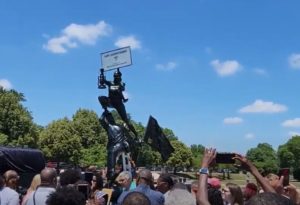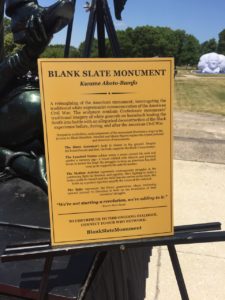Progress in combating systemic racism has been made, but so much more work remains.
That was the overarching perspective of roughly a dozen speakers this past Saturday at the Juneteenth Celebration and Reopening of the DuSable Museum of African American History on Chicago’s South Side. Due to the pandemic, the 60-year-old museum had been closed for the prior 15 months. Its reopening was perfectly timed to coincide with Juneteenth, only a few days after President Joe Biden signed a law making it a federal holiday.
On hand for the reopening along with my brother and niece, it was humbling to stand, literally and figuratively, with the hundreds of others who assembled to mark the moment. We heard from the likes of Chicago Mayor Lori Lightfoot and Cook County Board President Toni Preckwinkle. And we witnessed the unveiling of The Blank Slate Monument, a traveling sculpture that challenges “the onlooker to seek a deeper understanding of the “African American” experience before, during and after the American Civil War,” according to The Blank Slate Monument website.

I am a white man who grew up in a lily-white community in Boston’s suburbs. A professor my freshman year of college was the only black instructor that I had in my 17 years of formal education. Through high school, virtually all my classmates, teammates and close friends were white.
Over the course of my adult years, the homogeneity of my peer groups has diminished dramatically. Increasingly, my circle of close friends—especially in the church that I attend in Chicago’s Austin neighborhood—has resembled our nation’s rich ethnic diversity.
This brief personal timeline is offered as preamble to a sobering truth: while I may know of the struggle that black people (and other minorities) endure, I obviously don’t know what it is to walk in their shoes.

Ongoing Reminders Persist
There are ongoing reminders of just how limited my perspective has been. About a year ago, for instance, a dear black friend observed that he does not feel safe jogging in a neighboring town. At first, his remark shocked me; a few moments later, I was struck by the gap between his matter-of-fact observation and my outraged reaction. At the time, and even now, the thought arises: What else in his day-to-day life am I oblivious to?
Over time, my blind spots have decreased–or so I hope, at least. I have advocated for equity on a variety of levels, from my years serving in public office to my day-to-day decisions to step up for what is right. In the end, I suppose I am not unlike most people—doing my best to become part of the solution, and not the problem of racism, whether it’s in our country, our neighborhood, or our day-to-day encounters.
I am striving, imperfectly, to make progress. But so much work remains.
Related Posts:
Passionate bridge-builder: Kevin Coval, author of `A People’s History of Chicago’
‘Stretch Your Comfort Zone’ is my key message to Concordia University Chicago students
